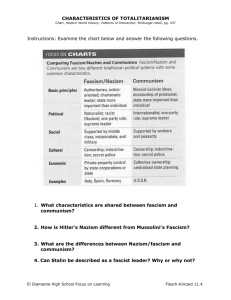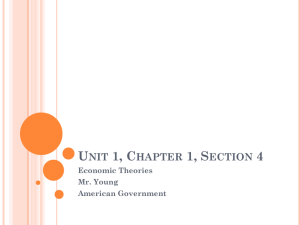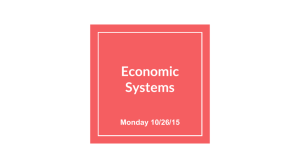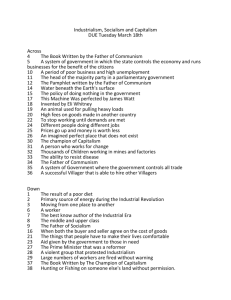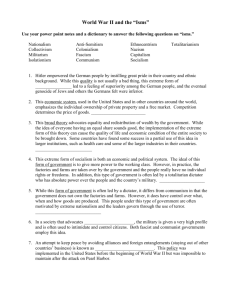Democratic Socialism, Fascism, and Communism
advertisement
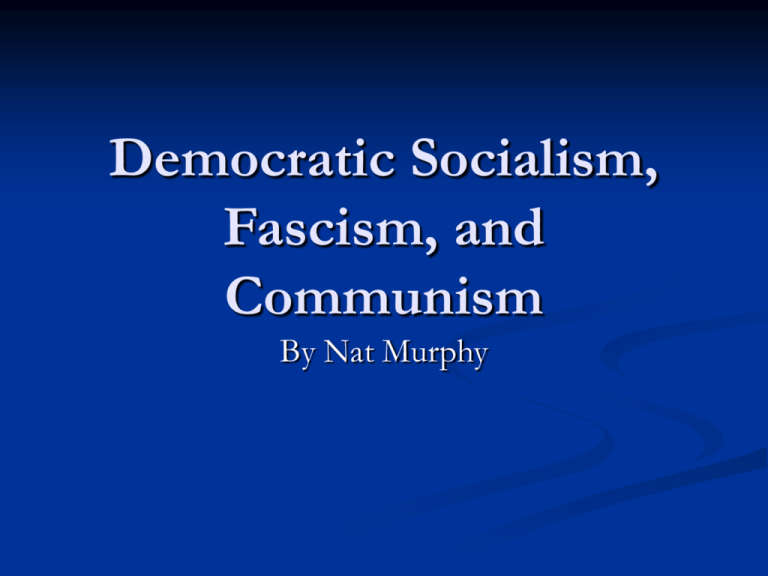
Democratic Socialism, Fascism, and Communism By Nat Murphy Overview These three things all have to do with how a nation is ruled and controlled. All three deal with the concept of private property and the redistribution of wealth for the betterment of society. Democratic Socialism Democratic- relating to, appealing to, or available to the broad masses of the people Socialism- any of various economic and political theories advocating collective or governmental ownership and administration of the means of production and distribution of goods Democratic Socialism cont. Socialism does not advocate the complete alleviation of private property from society. It does advocate a degree of wealth distribution to prevent abject poverty. The government collects money, in the form of taxes, to, among other things, help the citizens of its nation. Democratic Socialism Cont. Common applications of Socialism- Socialized Medicine, Medicare, Social Security, and Unemployment Benefits. The United States has Socialistic policies in place, but tends to lean away from complete Socialism. Current Nations with heavy Socialistic policiesThe United Kingdom, Canada, and France. Fascism Definition-a political philosophy, movement, or regime (as that of the Fascisti) that exalts nation and often race above the individual and that stands for a centralized autocratic government headed by a dictatorial leader, severe economic and social regimentation, and forcible suppression of opposition Fascism cont. A Fascist government depends on its citizens’ complete devotion to the state. Private property is allowed, as long as the citizens completely follow the laws of the nation. “It doesn’t matter who owns the business, as long as they do more for the nation than themselves with it.” Fascism Cont. The most obvious example of a Fascist regime is Hitler’s Third Reich during the early twentieth century, but Mussolini’s Italy and Franco’s Spain are other examples. Hitler’s rule is famous for the genocide of the Jewish people and many other atrocities. Fascism and Nazism are often confused for the same ideology. War time governments often become somewhat fascist to better their performance. Fascism Cont. This fact is noted in the Foreword by Pynchon. He says that during World War II the British government was just as fascist as the Third Reich. They controlled prices of goods, took control of factories, and played a larger role in the economy than they otherwise would. Communism Definition - a theory advocating elimination of private property b: a system in which goods are owned in common and are available to all as needed Notice the difference between Communism as a view of Economic policy, while Fascism leans toward a form of rule. Communism Cont. The most obvious examples of a communist nation are The Soviet Union, China, and North Korea. In truth there is no true communist run government. These are all totalitarian governements. They use the lack of private property to prevent the economic expansion of anyone, as opposed to stemming the unjust economic expansion of some. Communism cont. The theory of communism in its roots is that everyone is equal. This mind set is championed by Karl Marx in his “Communist Manifesto.” Marx advocated an uprising of the lowest class or the “Proletariat.” This class is represented by the Proles in 1984 Note that an uprising occurred to fix the problems of the world, but instead a class just like the proletariat was created. Communism cont. Communism only works in theory not in actuality. If someone were to rule over a communist nation there would be a mass violation of the theory of communism. The tenet that everyone is equal would be violated. In 1984 It is obvious, as well as stated in the foreword, that Goldstein represents Trotsky, while Big Brother is Stalin. Youtube Video http://www.youtube.com/watch?v=kxXhqxtm Hjo First Two Minutes The progression of governments described in the video is the Polybius Circle. This process is illustrated in 1984. The government of Oceania is one just like the one illustrated in the video. Video cont. The Polybius Circle describes an evolution of governments, as seen by a Greek philosopher. 1. Monarchy, 2. Kingship, 3. Tyranny, 4. Aristocracy, 5. Oligarchy, 6. Democracy, and 7. Ochlocracy. Ochlocracy could be translated as anarchy. This type of progression is seen in 1984. Works Cited Merriam Webster's Dictionary Online Western Civilization by Spielvogel Sixth Edition The John Birch Society British Broadcasting Company Works Consulted British Broadcasting Corporation. British Broadcasting Company. 11 Jan. 2009 <http://www.bbc.com>. Merriam Webster's. Merriam Webster's. 11 Jan. 2009 <http://www.merriam-webster.com/>. Spielvogel, Jackson. Western Civilization. New York: Wadsworth, 2005. "The John Birch Society". John Birch Society. 1/11/09 <http://www.jbs.org/>.
